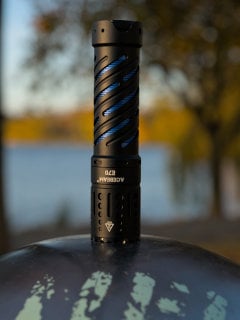Hi Anduril user’s !
I noticed that the momentary turbo does not work for 4H from the “ON” state (3H for those who do not have tint ramping).
To fix it, I have to comment out line 423:
if (! arg) { // first frame only, to allow thermal regulation to work
Do you have the same behavior?
Thank you and good day
Hi, multi-channel Emisar D2 user here, Model number 0135,
emisar-2ch, using ToyKeeper’s latest Anduril 2 version,anduril.2023-08-07.emisar-2ch.hex: At my end, momentary turbo 3H/4H works just fine and as expected, so I do not have the same behavior.4H from ON for momentary turbo works with every channel mode, whether there is tint ramping or not, and 3H from ON for momentary turbo works when there is no tint ramping with the selected channel mode; all exactly as displayed in the diagram.
Hi thank’s for your help. I rollback two custom modification ans it’s working again :
- reduce #define HOLD_TIMEOUT from24 to 20 & reduce #define RELEASE_TIMEOUT from 18 to 16
- Apply #2027884 & #2027883 correction suggestion from https://bugs.launchpad.net/flashlight-firmware/+bugs?orderby=importance&start=0
I will investigate which of this two changes cut my turbo off
Glad to hear it’s working. @Protiron@lemmy.world if you are still stumped I was going to suggest posting to this thread on budget light forum where Toykeeper is active: https://budgetlightforum.com/t/anduril-2/62656/1604
Good question, just wanted to point out your link
[https://bazaar.launchpad.net/~toykeeper/flashlight-firmware/multi-channel/view/head:/ToyKeeper/spaghetti-monster/anduril/ramp-mode.c#L423]()markdown is broken but copy-pasting the url works.
Thank you, I fix it. Does Momentary Turbo 3H/4H work four you?
Speaking of testing locally - how do folks test code changes? Actually flash them to driver, or is there some kind of way of simulating the inputs and outputs? I’m guessing there isn’t an Anduril emulator.
Yes, you could (theoretically) use an emulator for the microcontroller. I tried it a few times. And it isn’t fun. It takes a lot of effort to simulate all inputs, outputs are hard to interpret and all kind of effects of the real light aren’t reproduced.
In reality we flash the build onto a flashlight and try it. Sometimes it’s only a prototype, disassembled. And rarely it’s an actual devboard which has all relevant parts of the flashlight nicely accessible (basically the microcontroller with required electronics, regulated power supply, low power LED to see the output, several LEDs for aux and button and the switch itself).


